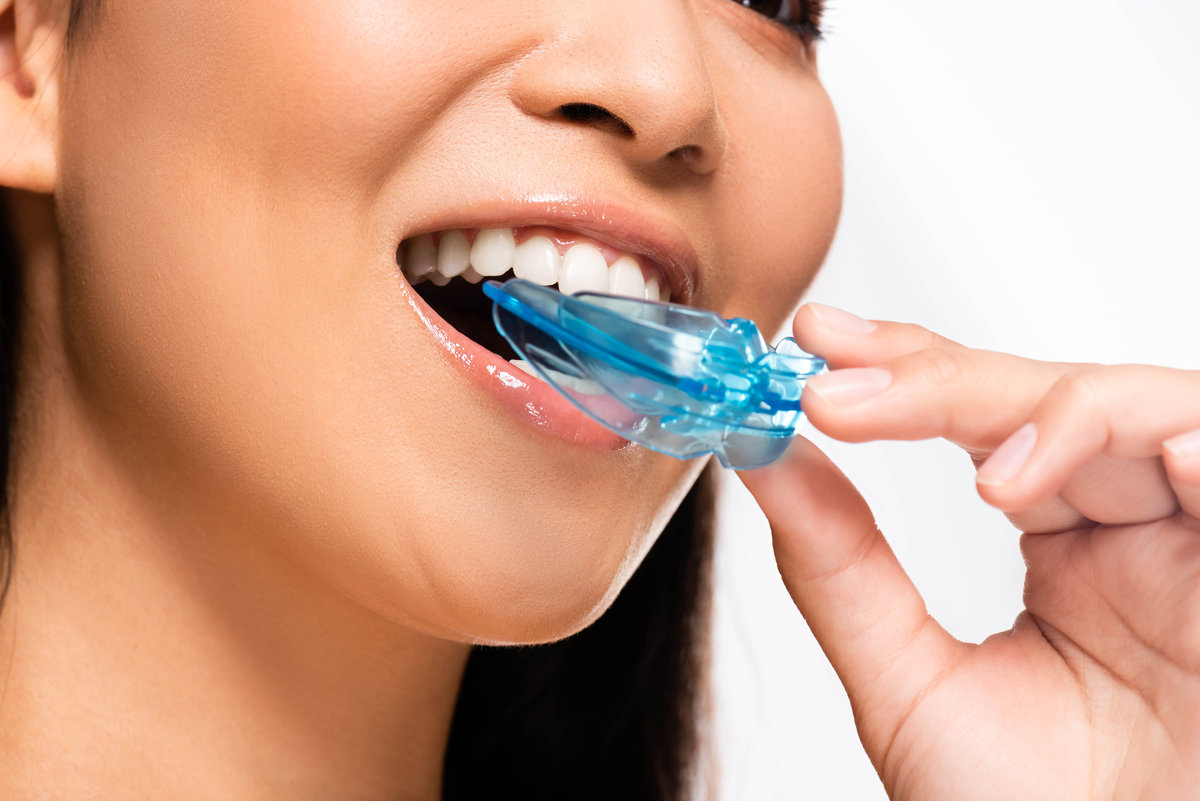Accepting New Patients
At Oasis Dental, we help patients protect their smiles from the damaging effects of teeth grinding and clenching. If you wake up with jaw pain, headaches, or worn teeth, you may be grinding your teeth at night without even realizing it. Custom nightguards created by Dr. Sagar Amin provide comfortable, effective protection that preserves your teeth and eliminates discomfort caused by nighttime grinding.
Don’t let teeth grinding silently damage your smile while you sleep.

Teeth grinding, medically known as bruxism, is the unconscious clenching or grinding of teeth. While some people grind their teeth during the day, most grinding occurs at night during sleep. Because you’re unconscious, you have no control over this habit and may not even know you’re doing it.
Sleep bruxism can be surprisingly forceful. The pressure exerted during grinding can be several times stronger than normal chewing force. This excessive pressure wears down tooth enamel, causes teeth to crack or chip, damages dental restorations like fillings and crowns, and puts tremendous stress on your jaw joints and muscles.
Many people discover they grind their teeth only when a dentist notices the wear patterns on their teeth or when a sleep partner complains about the grinding noise. Others experience symptoms that alert them to the problem.
Complete dental care for every member of your family with financing options that fit your budget.

Several symptoms suggest you may be grinding or clenching your teeth at night. Waking up with a sore jaw or facial pain is one of the most common indicators. The muscles in your jaw work overtime while you sleep, becoming tired and painful.
Frequent morning headaches, particularly tension headaches around your temples, often result from the muscle strain caused by grinding. Worn, flattened, or chipped teeth are visible evidence of grinding. Your teeth should have defined edges and cusps, not flat, smooth surfaces.
Tooth sensitivity or pain can develop as grinding wears away protective enamel, exposing the sensitive inner layers of your teeth. Pain or clicking when you open your mouth wide may indicate temporomandibular joint (TMJ) problems caused or worsened by grinding.
Indentations on your tongue or inside your cheeks suggest you’re clenching tightly during sleep. Disrupted sleep or waking frequently during the night can be related to grinding. A sleep partner who hears you grinding your teeth at night provides clear evidence of the problem.
If you experience any of these symptoms, schedule an evaluation at Oasis Dental. Dr. Amin can examine your teeth and jaw for signs of grinding and determine if a nightguard would benefit you.
A nightguard, also called an occlusal guard or bite guard, is a protective appliance worn over your teeth while you sleep. It creates a barrier between your upper and lower teeth, preventing them from grinding against each other. Think of it as a cushion that absorbs the force of grinding and clenching, protecting your teeth and reducing stress on your jaw muscles and joints.
Professional nightguards from Oasis Dental are custom-made to fit your teeth precisely. Dr. Amin takes detailed impressions of your teeth, which are sent to a dental laboratory where technicians fabricate a nightguard designed specifically for your mouth. This custom fit ensures maximum comfort and protection.
Custom nightguards differ significantly from over-the-counter options available at drugstores. Store-bought guards use a one-size-fits-all or boil-and-bite approach. While they’re less expensive initially, they often fit poorly, feel bulky, and can be uncomfortable to wear. Many people give up on over-the-counter guards because they’re too uncomfortable for regular use.
Custom nightguards fit snugly and comfortably, making them much easier to wear consistently. They’re also more durable and effective at protecting your teeth. The investment in a custom nightguard pays off through better protection, greater comfort, and longer lifespan.
Different types of nightguards serve different purposes. Soft nightguards are made from a pliable, rubber-like material. They’re the most comfortable option and work well for mild grinding. However, some people find that the soft material encourages more clenching or chewing on the guard.
Hard acrylic nightguards are made from rigid plastic. They’re extremely durable and effective for moderate to severe grinding. Hard guards can feel less natural initially but provide superior protection for heavy grinders. Many dentists prefer hard guards because they discourage clenching and last longer.
Dual laminate nightguards combine both materials, with a soft inner layer for comfort and a hard outer layer for durability. These guards offer the best of both worlds and work well for many patients.
Dr. Amin will recommend the type of nightguard best suited for your grinding severity, jaw structure, and personal preferences. The goal is to find a nightguard you’ll actually wear consistently, as the best nightguard is the one you’ll use every night.
Getting a custom nightguard at Oasis Dental is straightforward and typically requires two appointments. During your first visit, Dr. Amin will examine your teeth and jaw to confirm that grinding is occurring and assess the extent of any damage. He’ll look for wear patterns on your teeth, check your jaw joints for tenderness or clicking, and discuss your symptoms.
If he determines a nightguard is appropriate, he’ll take detailed impressions of your teeth using either traditional impression material or digital scanning technology. These impressions capture the exact shape and size of your teeth for a perfect fit. You’ll also choose the type of nightguard material you prefer.
The impressions are sent to a dental laboratory where skilled technicians fabricate your custom nightguard. This process typically takes one to two weeks. When your nightguard is ready, you’ll return for your second appointment. Dr. Amin will try the nightguard in your mouth and check the fit carefully. He’ll make any necessary adjustments to ensure comfort and proper bite alignment.
Before you leave, Dr. Amin will provide detailed instructions on inserting and removing your nightguard, cleaning and storing it properly, and what to expect during the adjustment period. He’ll also let you know when to return for follow-up to ensure the nightguard is working effectively.
Wearing a nightguard takes some getting used to. It’s normal for it to feel strange or bulky at first. Your mouth needs time to adjust to having something in it while you sleep. Most people adapt within a few days to two weeks of consistent use.
You might produce more saliva initially, as your mouth perceives the nightguard as food. This typically resolves within a few nights. Some people experience minor jaw soreness for the first few days as muscles adjust to the new position. This discomfort should be temporary and mild.
If your nightguard causes significant pain, makes it difficult to breathe, or feels extremely uncomfortable after a week of use, contact our office. Dr. Amin can adjust the fit to improve comfort. Don’t give up on your nightguard too quickly. Consistency is key, and most people find that wearing it becomes second nature within a couple of weeks.
Proper care extends the life of your nightguard and keeps it clean and fresh. Rinse your nightguard with cool water immediately after removing it each morning. This washes away saliva and debris. Brush your nightguard gently with a soft toothbrush and mild soap or non-abrasive denture cleaner. Avoid using toothpaste, as it can be too abrasive and scratch the surface.
Rinse your nightguard thoroughly to remove all soap or cleaner before storing it. Store your nightguard in its protective case when not in use. The case should have ventilation holes to allow air circulation and prevent bacterial growth. Keep the case clean by washing it regularly.
Avoid exposing your nightguard to high heat, which can warp the material. Don’t leave it in direct sunlight, hot cars, or near heat sources. Keep your nightguard away from pets, as dogs particularly love to chew on them.
Bring your nightguard to dental appointments so Dr. Amin can check its condition and ensure it’s still fitting properly. Your nightguard may need adjustments over time as your teeth or bite change.
The benefits of consistent nightguard use are substantial. Nightguards protect your tooth enamel from wear, preserving your natural teeth for life. They prevent chips and cracks in teeth, avoiding the need for costly repairs. Nightguards also protect dental work like crowns, veneers, and fillings from damage.
By reducing strain on jaw muscles, nightguards alleviate morning jaw pain and facial soreness. Many patients experience fewer headaches once they start wearing a nightguard regularly. Nightguards can improve sleep quality by reducing the muscle activity associated with grinding. Some people sleep more soundly and wake feeling more rested.
For patients with TMJ disorders, nightguards reduce stress on the jaw joints and can help manage symptoms. The long-term cost savings are significant. Preventing damage is much less expensive than repairing worn, cracked, or broken teeth. A custom nightguard can save you thousands of dollars in future dental work.
While a nightguard protects your teeth from grinding damage, it doesn’t stop the grinding behavior itself. Understanding and addressing the underlying causes can help reduce grinding over time. Stress and anxiety are the most common triggers for teeth grinding. Finding healthy ways to manage stress through exercise, meditation, counseling, or relaxation techniques may reduce grinding.
Certain sleep disorders, particularly sleep apnea, are associated with increased grinding. If you suspect you have sleep apnea, discuss it with your doctor. Caffeine and alcohol consumption, especially close to bedtime, can worsen grinding. Reducing or eliminating these substances may help.
Some medications, particularly certain antidepressants, can cause or worsen bruxism. If you started grinding after beginning a new medication, discuss this with your doctor. Poor sleep posture can contribute to grinding. Ensure your pillow properly supports your head and neck.
Teeth grinding is common in children, especially during the teething years and as permanent teeth come in. Most children outgrow grinding without treatment. However, if grinding is severe, causing pain, or damaging teeth, a nightguard may be necessary.
Dr. Amin can evaluate whether your child would benefit from a nightguard. Children’s nightguards need to be replaced more frequently as their mouths grow and teeth change. We’ll monitor your child’s development and adjust treatment as needed.
Dr. Sagar Amin has extensive experience creating custom nightguards that fit comfortably and protect effectively. We use high-quality materials and work with skilled dental laboratories to ensure your nightguard is durable and precise. Our team takes time to ensure proper fit and makes as many adjustments as needed for your comfort.
We provide thorough instructions on nightguard care and use, and we’re always available to address concerns or make adjustments. Our modern practice offers a comfortable environment where you can discuss your grinding concerns without judgment.
Don’t let teeth grinding silently destroy your smile. Contact Oasis Dental today to schedule an appointment with Dr. Amin. We’ll evaluate your teeth and jaw, discuss whether a nightguard is right for you, and create a custom appliance that protects your teeth and eliminates grinding-related discomfort.
Your teeth work hard for you every day. Give them the protection they deserve at night.
